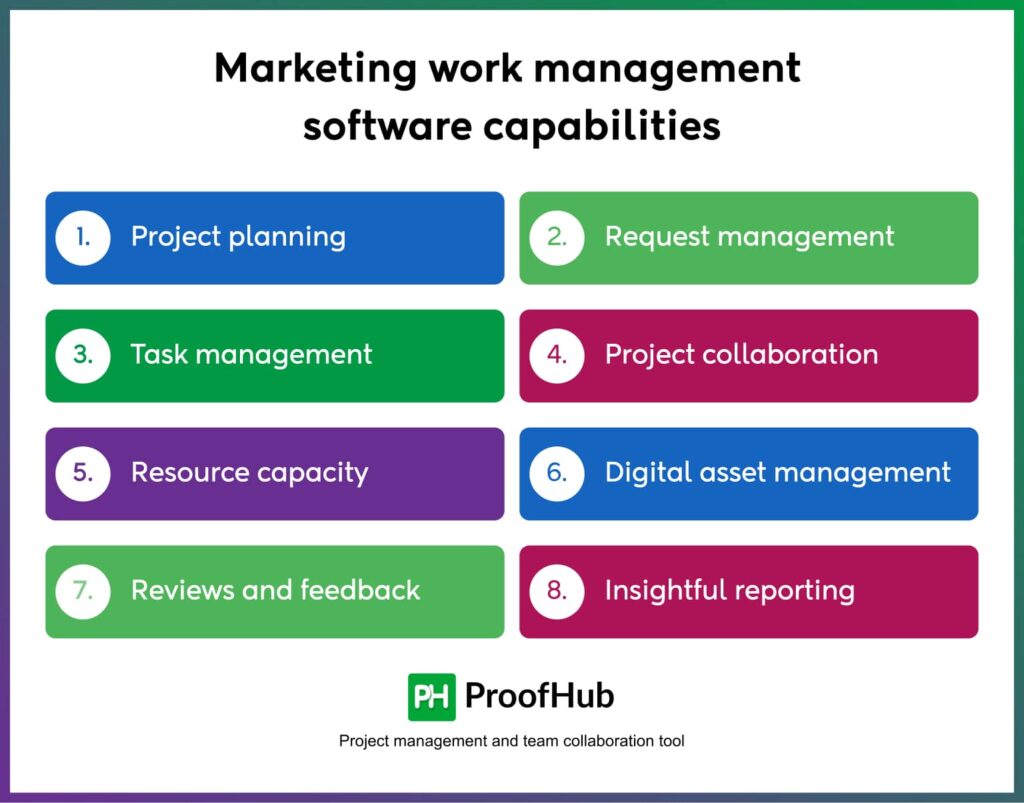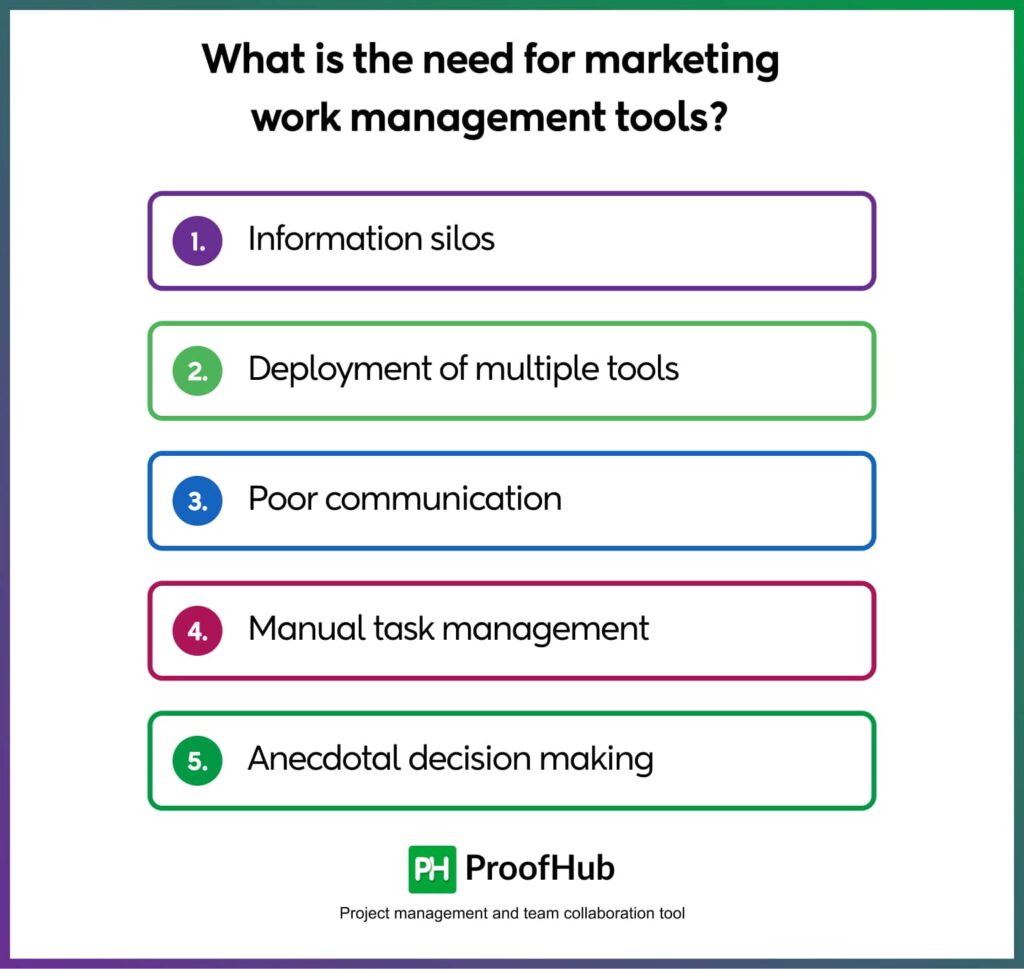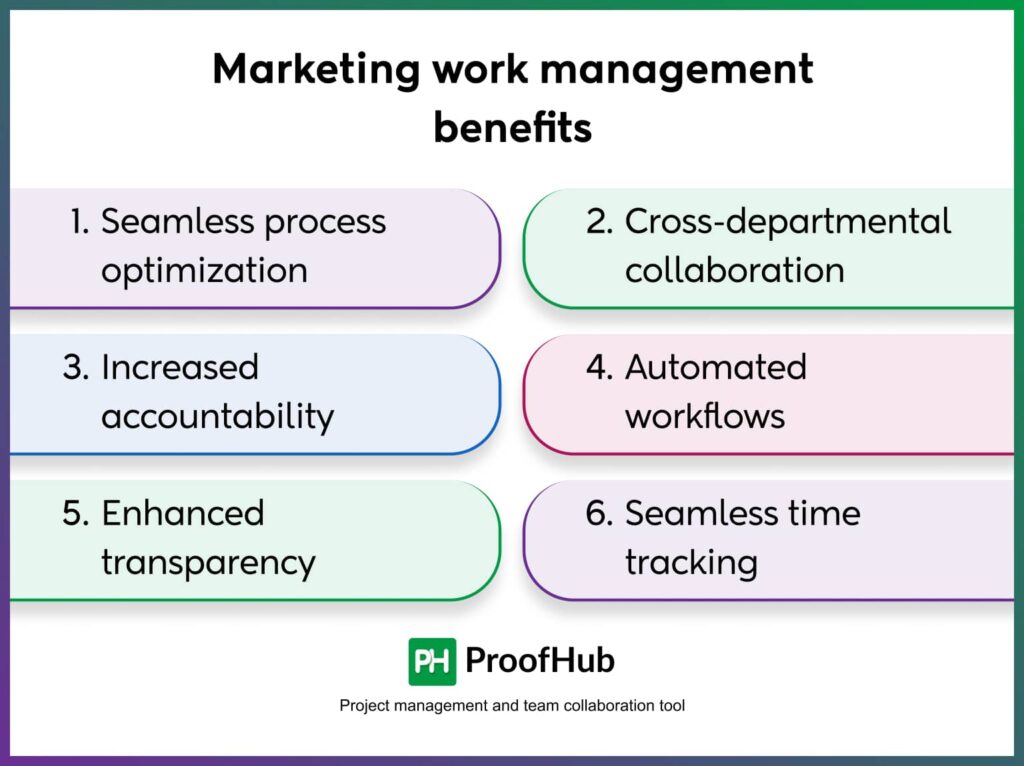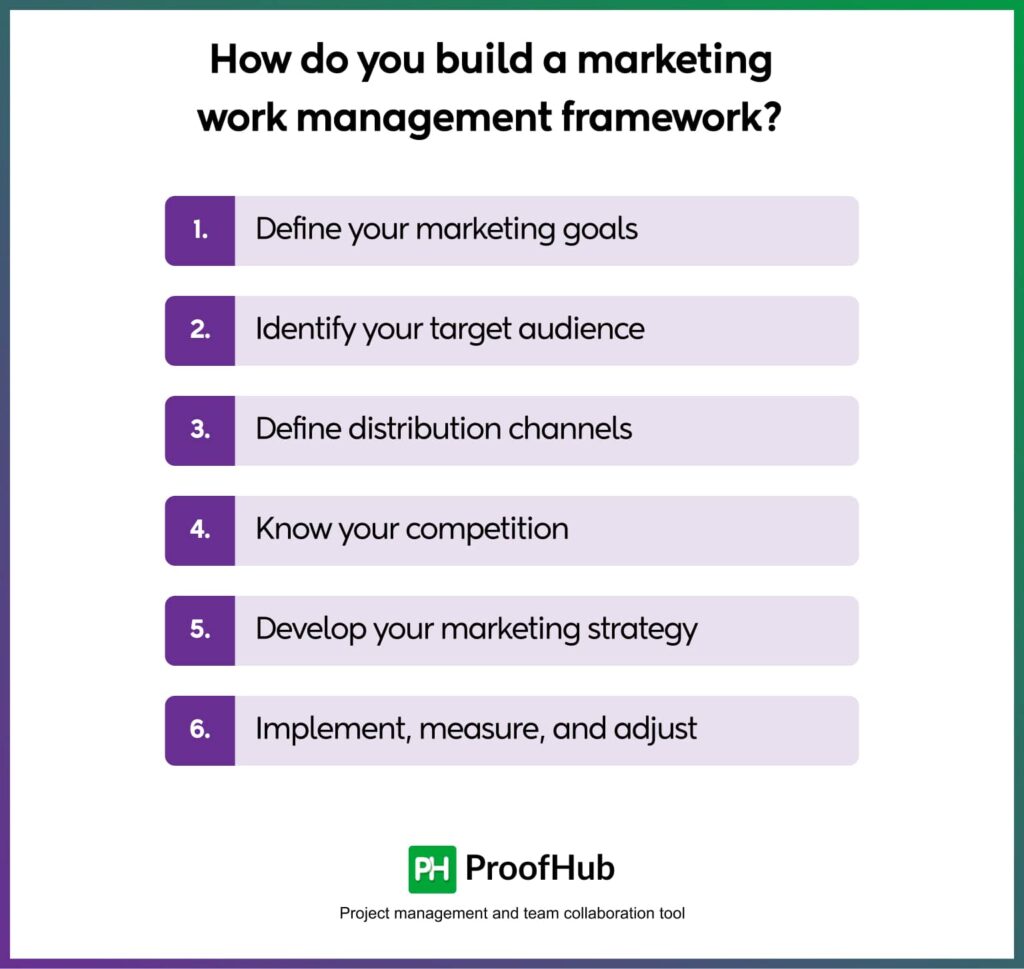As a marketing manager, you need to juggle multiple projects, deadlines, stakeholders, manage resource constraints, and sift through the prioritization dilemmas. It’s a lot to handle while juggling your routine responsibilities. However, with a structured approach like marketing work management (MWM), you can apply a strategic approach to planning, executing, and optimizing marketing workflows.
In this article, we’ll explore what marketing work management is all about – its objectives, capabilities, and benefits. We will also discover how MWM software like ProofHub can make marketing workflows more efficient.
But first, let us figure out what marketing work management means.
What is marketing work management?
Marketing Work Management (MWM) is the process of organizing, executing, and optimizing marketing tasks to ensure efficiency and effectiveness. It involves tools, processes, and strategies that help managers streamline workflows and improve team collaboration.
Its main objective is to streamline routine marketing operations for seamless marketing projects, campaigns, and programs. That is achieved by organizing and centralizing communications, resources, assets, and all other marketing aspects.
It helps marketing managers align team efforts and stakeholder objectives cohesively toward shared goals. This way, they achieve their marketing objectives without any hiccups.
Read more: Explore our comprehensive guide to marketing project management to streamline your marketing work management strategies
What is a marketing work management software?
Marketing work management software or MWM platforms are designed to help marketing teams manage, optimize, and streamline marketing initiatives for friction-free operations.
They can use these powerhouse suites to collaborate on marketing and creative projects, make data-driven decisions, and meet deadlines effectively to achieve greater results. Consider these tools similar to work management software designed specifically to satisfy the needs of marketing teams.
Read more: Discover the list of 26 best marketing tools to enhance and achieve seamless marketing operations
What are the key components of marketing work management?
1. Project planning: A clear project plan outlines goals, tasks, deadlines, and assigned team members to ensure smooth execution.
2. Task management: Breaking projects into smaller tasks makes them manageable. Assigning responsibilities helps track progress.
3. Collaboration tools: Marketing teams use communication tools like Slack and project management software like ProofHub to stay aligned.
4. Workflow automation: Automating repetitive tasks like email marketing and social media scheduling improves efficiency.
5. Performance tracking: Analyzing KPIs such as engagement rates, conversion rates, and ROI helps measure success.
What are the capabilities of marketing work management software?

MWM software offers robust work management capabilities to organize workflows. These help managers execute campaigns within deadlines and budgetary constraints.
1. Project planning
An MWM software is a marketing interface that assists you in creating a perfect project plan. You can define project scope, goals, milestones, deadlines, and deliverables to paint a clear picture for your team. By creating a visual project timeline and allocating resources based on requirements, you can keep your projects on track.
2. Request management
Marketing work management software must allow you to capture work requests and support queries. Because marketing requires a lot of input from both internal and external stakeholders. By staying updated on every work request, you can translate these swiftly into tasks for prompt action.
3. Task management
Task management with drag-and-drop functionality is one of the prime features of MWM software. You can use it to break down the marketing project into manageable tasks and subtasks. You can seamlessly create, manage, and delegate tasks and define deadlines to enhance accountability in your team.
Read more: Drive your marketing campaign success with the 21 best task management tools
4. Project collaboration
Marketing management software enhances coordination and collaboration among teams with real-time communication. It offers a centralized interface for your team to come together to look for solutions and speed up the delivery process. You can also invite stakeholders on board without providing them full access to the campaign nitty-gritty.
5. Resource capacity and workload
The marketing work management platform assists marketing leaders in managing resource workload and capacity check-up processes. Because they often tend to overlook employees’ work burden challenges when allocating resources to tasks. However, with enhanced oversights, you can eliminate discrepancies that cause employee burnout and overwhelm.
Read more: Ensure your team doesn’t feel loaded by unreasonable workload challenges with the 11 best workload management tools
6. Digital asset management
Asset management and version controls are great features to look out for in a work management tool. Why? Because marketing teams and executives often struggle with locating assets and accessing required file versions. You can utilize the tool to house all assets together in one place for easy storage, access, and sharing.
7. Reviews and feedback
Marketing work management tools streamline asset approval processes, too. This means you need not dip into the frustrating and time-consuming email cycles to provide and look for feedback. Instead, you can view and review your assets, get approvals altogether, and save yourself from multiple rounds of revisions.
8. Insightful reporting
A marketing work management tool offers impressive reporting capabilities for enhanced visualizations. It allows your team to stay in sync with how the marketing project is progressing and performing. Also, you can easily identify the bottlenecks and inefficiencies for timely action and elimination.
Read more: Track your marketing campaigns’ progression from inception to execution using marketing reporting for optimal outcomes
Why a marketing work management tool is important?

The demand for MWM tools is growing due to their versatile nature. However, here are a few challenges that further emphasize why they must be a part of the marketing team tech suite.
1. Information silos
The marketing tasks are spread across various departments and domains. With this scattered information, there is a high tendency for information silos to form, compromising progress.
This leads to increased frustration, missed deadlines, and, ultimately, campaign failure. Interconnecting and initiating collaboration across various marketing functions can enhance project visibility and establish a unified understanding.
How does marketing work management software help?
Work management software creates a consolidated space for all your marketing information. You need not sift through spreadsheets or digital storage units to access critical data and find what you need.
2. Deployment of multiple tools
Information rise is one thing – the wide accumulation and dependence on tools is another task. Why? As it can take a toll on your productivity and budget.
You are drafting emails to connect with clients and stakeholders and depend on a team chat tool to facilitate team communication. On the other hand, you are managing approval processes on one platform while simultaneously switching to reporting tools.
That’s not just the end. The list goes on. And do not forget the additional cost that comes with this inefficiency.
How does marketing work management software help?
WMS software provides a single platform to manage resource management, task assignments, time tracking, and more, eliminating the need to hop between multiple platforms. It cuts down on the cost that goes into implementing, maintaining, and providing training to various tools – especially when you are under budget constraints.
3. Poor communication
Marketing work is no one-man show. It requires strong coordination and collaboration. However, potential communication breakdown, miscommunication, and poor communication practices can abruptly result in consequences snowballing in no time.
According to 43% of leaders surveyed, poor communication degrades productivity, while 42% claim it leads to missed deadlines and extended timelines.
The communication risk widens further when different locations and time zones get involved. Results? Duplicated work.
How does marketing work management software help?
A marketing work management tool provides your team with the real-time ground to play off. They can seamlessly collaborate, brainstorm, and discuss relevant marketing strategies. Also, they can seamlessly share files and get task updates for better coordination.
4. Manual task management
The sheer volume of marketing tasks is a lot to handle. With multiple projects and campaigns running, the manual handling of tasks becomes overwhelming.
Manually allocating resources, organizing and storing marketing assets, and routing marketing materials or projects for review and approval are a lot to handle.
How does marketing work management software help?
Marketing work management systems provide automation features to automate various campaign aspects and ensure consistency. Some of these facets are creating workflows, handling recurring tasks, setting task dependencies, and more. This frees up your and your team’s valuable time for other strategic and creative initiatives.
5. Anecdotal decision making
Marketing work is no guessing game or an intuitional pursuit. You just can’t make impulsive decisions without looking into the historical metrics and future projections. This may lead to abrupt shifts in strategies, ineffective optimizations, and even campaign failure.
As a marketing manager, you must make data-driven decisions to ensure campaign success. However, with vast amounts of data dispersed across the organization, you may easily lose oversight of key performance indicators.
How does marketing work management software help?
Enterprise marketing work management tools help you get a bird’s eye view of your performance metrics. You can utilize the information to spot bottlenecks and work on inefficiencies to optimize your marketing strategy and obtain the maximum out of your efforts.
What are the benefits of marketing work management?

Every marketing team wants to pull off impactful marketing campaigns and drive value. And that is possible with innovative marketing work management strategies.
Here are a few benefits that marketing teams can reap after the implementation of these practices:
1. Seamless process optimization
A centralized marketing work plan ensures no one wastes time searching for information. This ensures they have a clear understanding of task ownership, deadlines, and agenda for projects. With this clarity, no one is wasting time duplicating efforts and missing deadlines.
2. Cross-departmental collaboration
Marketing teams require coordination with design, engineering, and sales teams. They all must work in a cohesive direction to work harmoniously and get work done. With marketing work management, everyone receives a centralized platform for information sharing, preventing information silo formation.
3. Increased accountability
Marketing work management tools allow you to assign task owners, add deadlines, and define priorities. This creates a crystal clear responsibility map for teams, ensuring no one falls behind and makes their contributions to crushing common marketing goals.
4. Automated workflows
Most marketing work management tools help marketing teams automate recurring, manual, and routine tasks. By automating these tedious and time-consuming processes, you can introduce efficiency and productivity in your workflow. It saves you time and allows you to invest it in other strategic initiatives and core tasks.
5. Enhanced transparency
MWM philosophy is built on the concept of creating shared and transparent workflows. Real-time notifications ensure team members are constantly informed of task updates. You can even give stakeholders comprehensive visibility into workflow while limiting their access to information not relevant to them.
6. Seamless time tracking
Many marketing work management tools provide built-in time trackers to track time spent on tasks by employees. They can add time estimates and compare them against the actual time spent. Managers can utilize the information to calculate employee-focused hours on specific projects.
How to create your marketing work management framework?

A marketing management framework is a strategic master plan tailored to your specific needs to achieve your marketing objectives. This personalized visual representation details all the principles, processes, and instructions to capitalize on your marketing efforts.
Here are the essential steps to build the foundation of your marketing work management and accomplish your goals:
1. Define your marketing goals and objectives
Start by defining what you aim to achieve from your marketing initiatives. Outline all the short-term or long-term goals you intend to meet and consolidate them in clearly defined stages. Make sure they are measurable and achievable. It provides a direction for your team to align their efforts.
2. Identify your target audience
Next up, gather data on who you want to target with your marketing campaigns. While doing so, make sure to stay informed on the parameters that influence your audience. What is it that makes them engage with your brand?
3. Define distribution channels and marketing tactics
Identify the channels where your target audience is most present. Is it online channels like LinkedIn, Facebook, or X or offline like building public relations, events, or more? Along with choosing the right channels, also explain how you plan to reach your audience. Is it through advertising, email marketing, social media, content marketing, or something else?
4. Know your competition
Never step into the market without knowing your opponent. Run a SWOT analysis to identify your organization’s strengths, weaknesses, opportunities, and threats. Identify the loopholes they are not addressing and the domains they are excelling.
5. Develop your marketing strategy
Now that you have all the necessary insights with you draft your marketing strategy strategically. Structure it around ‘Hows’ and ‘Whys,’ explaining how you want to achieve an objective. Define clear workflows, responsibilities, and roles so that everyone knows what is expected of them. Also, outline the sequence in which you want to move forward.
6. Implement, measure, and adjust
Once you are done forming your action plan, the right thing to do is to execute your marketing initiatives. After the implementation, run a performance analysis of your campaign. Make sure always to conduct effectiveness tests at each defined stage. Look for roadblocks hampering your campaign progression, and make data-driven adjustments to the course. Do not be reluctant to change if you want to optimize your marketing campaign for continuous improvement.
Read more: Streamline your marketing strategies with effective marketing project management tips
Streamline your marketing work with ProofHub
Marketing work management transforms the way marketing teams operate. And ProofHub helps you implement these practices for maximum efficiency and impact.
It is an all-in-one marketing work management platform that optimizes your campaign efficiently and seamlessly. You can trust ProofHub to handle all the marketing projects and end-to-end marketing campaign operations.
Here are key ways ProofHub turns marketing work into an actionable plan:
- It assists you in marketing campaign planning to set a direction for everyone. It informs them of their roles and contributions to achieving marketing objectives.
- It streamlines your workflow by standardizing processes and utilizing automation for recurring tasks.
- It facilitates efficient and seamless collaboration among stakeholders and team members to deliver deliverables on time.
- It provides you with real-time visibility into your marketing projects to stay on top of performance metrics and spot bottlenecks.
Focus on what matters most – experience streamlined workflows – and introduce efficiency, clarity, and organization to your marketing objectives.
FAQs
What is the marketing management process?
The marketing management process is an initiative to obtain marketing campaign success. It involves various steps, like –
- Defining marketing objectives
- Identifying target audiences
- Analyzing marketing trends and opportunities
- Creating marketing strategy
- Monitoring and optimizing strategy
What are the best tools for marketing work management?
The best tools for marketing work management include ProofHub, Asana, Trello, and Wrike. These platforms help streamline workflows, improve team collaboration, automate repetitive tasks, and track performance effectively.
What is the role of marketing management?
Marketing management is the process of overseeing, managing, and executing marketing strategies. Its ultimate goal is to achieve marketing objectives with utmost efficiency and zero time wastage.
What are the key features of marketing work management platforms?
Marketing work management platforms offer a variety of features to streamline marketing operations. Some of these include project management, task management, digital asset management, task automation, etc.

